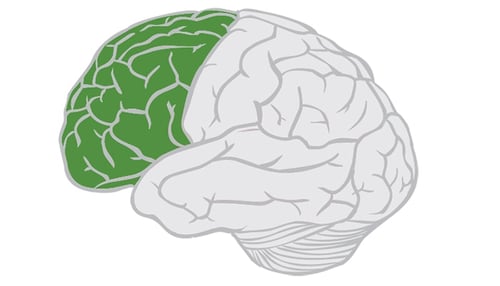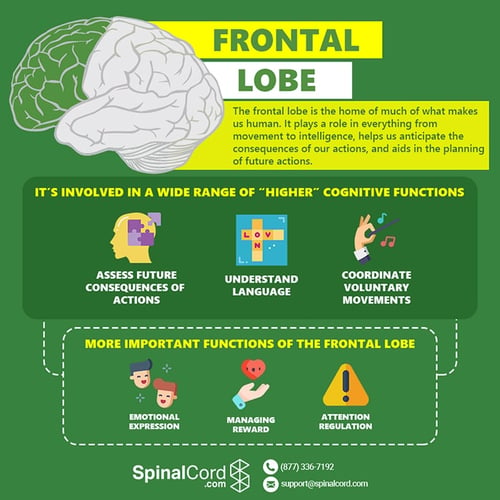What Happens when The Frontal Lobe is Damaged?
Most people experience some atrophy in the frontal lobe in their senior years, with frontal lobe volume decreasing by .5%-1% each year beginning around age 60. This slow and steady decline accounts for many of the changes, such as mild memory loss and difficulty with finding some words, associated with normal aging. More rapid frontal lobe decline can lead to symptoms of dementia.
The frontal lobe is highly vulnerable to damage for at least two reasons: first, as the last brain region to fully develop, developmental anomalies—including child abuse, an insufficiently stimulating environment, drug use, infections, and other factors—can permanently alter its development. Second, the frontal lobe's home in the front of the forehead renders it highly vulnerable, especially to auto accident-related injuries, violence, and falls. Even relatively minor blows can rattle the brain sufficiently to impede frontal lobe functioning.
The effect of frontal lobe damage is dependent on its location and severity, as well as how quickly it is detected. Children who face serious abuse may live with frontal lobe damage for years, while car accident survivors often get more immediate help. Treatment for frontal lobe injuries typically includes medical and psychological treatment, since the frontal lobe houses the emotional life and personality.
Overall health, age at the time of injury, quality of medical treatment, and an active and stimulating environment can all affect recovery trajectories. Seniors are more vulnerable to frontal lobe damage because their frontal lobes are already deteriorating. Likewise, people living in unstimulating environments, or who do not regularly “exercise” their brains may experience more rapid deterioration and only minimal improvement.
Frontal lobe damage can have extensive and far-reaching damage, as in the case of frontal lobe dementia, which leads to aggression, behavior changes, and difficulties with language. Some other consequences of frontal lobe damage include:
- Inability to engage immoral decision-making.
- Difficulties with planning, executive functioning, and attention.
- Loss of memory.
- Sudden and dramatic changes in personality.
- Declining intelligence.
- Changes in emotions, including signs of depression and anxiety.
- Difficulty understanding social cues or relating to the emotions of other people.
- Changes in motor skills and spatial reasoning abilities.
- A range of specific syndromes. One such syndrome, reduplicative paramnesia, causes a person to believe that is or her home is actually a precise replica of another location.
Sources:
- Frontal lobe: Functions, structure, and damage. Medical News Today. Accessed May 11, 2020. Learn More.
- Frontal Lobe – Cerebral Cortex | Lecturio. Youtube. Published April 16, 2018. Accessed May 11, 2020.
- SalazarAlejandra A. Frontal lobe: why is it so important? what happens if it is injured? Health, Brain and Neuroscience. Published October 2, 2019. Accessed May 11, 2020.
- Frontal Brain Lobe: Position, Functions, Diseases, Conditions. The Human Memory. Published October 29, 2019. Accessed May 11, 2020. Learn More.








